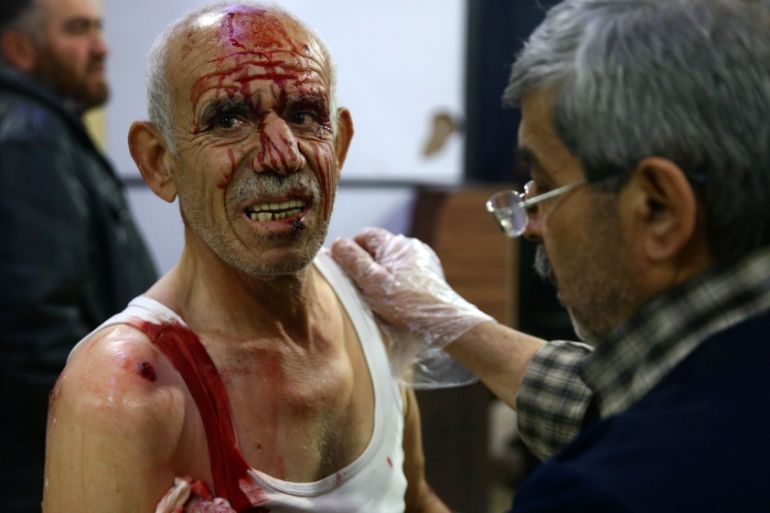Eastern Ghouta shelled despite ‘truce agreement’
UK-based monitoring group says Syrian government forces shelled Eastern Ghouta a day after a ceasefire was announced.

Syrian government forces have shelled a rebel-held enclave near the capital Damascus, according to a monitor, despite the announcement of a truce a day earlier.
The UK-based Syrian Observatory for Human Rights (SOHR) said the towns of Douma and Irbin in Eastern Ghouta were targeted on Wednesday with artillery shells. At least one person was killed in Irbin as a result of the shelling.
Keep reading
list of 4 itemsThe Take: Thirteen years later, has the world forgotten Syria?
Jordan army kills drug runners at Syria border amid soaring Captagon trade
Assad arrest warrant: ‘Hope and pain’ for Syrian chemical attack survivors
Misraba and Ein Tarma, two other towns in the district, were also struck, but only material damage was reported.
The reported shelling came after Staffan de Mistura, UN envoy to Syria, announced on Tuesday that the Syrian government had agreed to a Russian plan for a truce in Eastern Ghouta, following days of intense bombardment.
Government forces have been shelling Eastern Ghouta since November 14, killing more than 130 people and wounding many more, according to SOHR, which monitors the conflict via a network of sources on the ground.
Outside Syria, government negotiators arrived in Geneva on Wednesday for the latest round of UN-sponsored talks that began a day earlier between de Mistura and delegates representing some opposition groups.
The talks, held for the eighth time, will focus on Security Council Resolution 2254, which calls for a transitional government followed by general elections.
Drafted in December 2015, the document does not mention the fate of Syrian President Bashar al-Assad – a major sticking point for opposition groups included in the talks.
The opposition had wanted to discuss the possibility of removing Assad, but the government insisted it would not tolerate such a discussion,
Al Jazeera’s James Bays, reporting from the talks in Geneva, said the opposition delegation criticised de Mistura for focusing on select parts of the resolution.
“They say [that they want to start] with the first part of the resolution, [the] political transition, before moving on to a future constitution and elections supervised by the United Nations,” Bays said.
Government siege
The political talks were extended to December 15, but there is little hope for progress towards ending the Syrian conflict, now in its seventh year.
As events unfolded in Geneva, in New York the UN Security Council was set to be briefed on the humanitarian situation in Syria and the devastating impact of the war, now in its seventh year.
It came as UNICEF released a report calling for “unimpeded, unconditional and sustained humanitarian access to children in Syria”.
|
|
The UN children’s agency said that more than one-third of the children covered in its study, which was carried out in Eastern Ghouta in early November, were stunted.
This raised “their risk of delayed development, illness and death”, said UNICEF.
It also found that 11.9 percent of children under five were suffering from acute malnutrition, “the highest rate ever recorded in Syria” since the conflict started in 2011.
The report also said that the rapidly increasing costs of basic foods and cooking supplies – bread costs 85 times more in Eastern Ghouta than in nearby Damascus – has made preparing a meal out of reach for most residents.
“Children are the first to suffer from the dire consequences of siege,” Geert Cappelaere, UNICEF regional director for the Middle East and North Africa, said in a statement.
Hundreds of thousands of people have been killed in Syria’s seven-year conflict, while half of the population has been displaced.